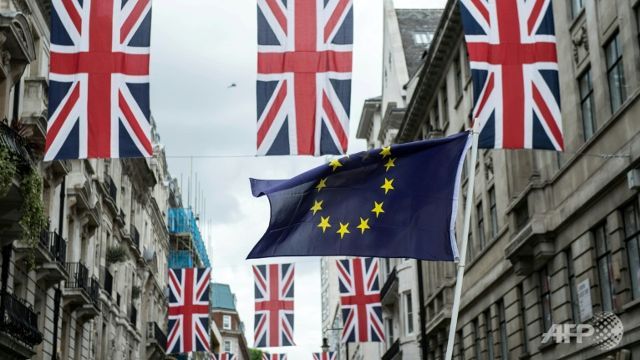Brexit: What we know
 |
| Following demands from business for stability during Brexit, the British government has signalled there could be a time lag between leaving the European Union and shifting to new relations with the EU. (AFP/CHRIS J RATCLIFFE) |
Prime Minister Theresa May on Tuesday (Jan 17) said for the first time that Britain would leave the EU's single market and seek a new customs deal with the bloc but the precise timings and terms of departure are uncertain as negotiations have yet to begin.
Here is an outline of what we know so far:
Referendum:
On Jun 23, 2016, Britons voted by 52 per cent in favour to 48 per cent against leaving the EU, although most voters in Scotland, Northern Ireland and London backed remaining part of the bloc.
Britain has had a love-hate relationship with Brussels since joining what was then the European Economic Community in 1973.
Prime Minister David Cameron, who took office in 2010, called the referendum in a bid to end long-standing divisions in his Conservative Party but his campaign for a vote to stay in the EU failed.
Timing:
Cameron's successor May has said she wants to trigger Article 50 - the formal procedure for leaving the European Union under the EU's Lisbon Treaty - by the end of March.
Finance minister Philip Hammond has said he then expects negotiations to begin before the summer.
Article 50 foresees a maximum two-year time period for the negotiations. If no deal is in place by then, Britain would have to leave without any agreement on future ties with the EU, unless the timeframe can be extended by unanimous agreement of all member states.
The EU's top Brexit negotiator Michel Barnier has said there should be an agreement in place ahead of the 2019 European Parliament elections.
Parliament:
Britain's Supreme Court is set to rule later this month on whether or not May must receive parliamentary approval before triggering Article 50.
If the court rules against May, the government may be forced to bring draft legislation before parliament which could in turn delay the start of negotiations.
Even though most MPs supported Britain staying in the EU, it is seen as highly unlikely that parliament would deny May the right to begin Brexit negotiations.
In any case, May on Tuesday promised that any final deal on Britain's future relations with the EU would go before both chambers of parliament for a vote.
Transition deal:
May also said on Tuesday she wanted a "phased approach" to ensure stability for businesses between the moment Britain leaves the EU and the implementation of its new relationship with the bloc.
"A phased process of implementation, in which both Britain and the EU institutions and member states prepare for the new arrangements that will exist between us will be in our mutual self-interest".
"We will seek to avoid a disruptive cliff edge," she said.
May added that all existing EU laws that apply in Britain will be turned into British laws under a "Great Repeal Bill" and parliament will then be able to choose which ones to keep, reject or amend.
Immigration:
May has said she will make cutting immigration a priority in negotiations, following a referendum in which it was a key argument of the Brexit camp.
Hundreds of thousands of people, mainly from eastern and southern Europe, move to Britain each year.
In her speech on Tuesday she gave no detail of what the new entry criteria will be for Europeans, but acknowledged that this demand would mean Britain leaving the EU's single market.
Trade:
May on Tuesday said she wanted "maximum possible access" for British companies to the single market even though Britain will not be a member and has also called for a new customs arrangement with the EU.
She said full customs union membership would prevent Britain from striking its own trade deals with other countries but added that Britain could remain a signatory to some parts of the customs union.
May also warned EU member states against pushing for harsh exit terms for Britain, saying it would be "an act of calamitous self-harm" for the EU.
She also threatened that she could "change the basis of Britain's economic model" - for example by slashing business taxes - if British companies were excluded from accessing the single market.
What the stars mean:
★ Poor ★ ★ Promising ★★★ Good ★★★★ Very good ★★★★★ Exceptional
Latest News
More News
- Russian President congratulates Vietnamese Party leader during phone talks (January 25, 2026 | 09:58)
- Worldwide congratulations underscore confidence in Vietnam’s 14th Party Congress (January 23, 2026 | 09:02)
- Political parties, organisations, int’l friends send congratulations to 14th National Party Congress (January 22, 2026 | 09:33)
- 14th National Party Congress: Japanese media highlight Vietnam’s growth targets (January 21, 2026 | 09:46)
- 14th National Party Congress: Driving force for Vietnam to continue renewal, innovation, breakthroughs (January 21, 2026 | 09:42)
- Vietnam remains spiritual support for progressive forces: Colombian party leader (January 21, 2026 | 08:00)
- Int'l media provides large coverage of 14th National Party Congress's first working day (January 20, 2026 | 09:09)
- Vietnamese firms win top honours at ASEAN Digital Awards (January 16, 2026 | 16:45)
- ASEAN Digital Ministers' Meeting opens in Hanoi (January 15, 2026 | 15:33)
- ASEAN economies move up the global chip value chain (December 09, 2025 | 13:32)
















 Mobile Version
Mobile Version